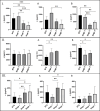Expression of individual members of the TGF-β/SMAD signalling pathway in the progression and survival of patients with colorectal carcinoma
- PMID: 39523401
- PMCID: PMC11551139
- DOI: 10.1038/s41598-024-79463-3
Expression of individual members of the TGF-β/SMAD signalling pathway in the progression and survival of patients with colorectal carcinoma
Abstract
Current knowledge of tumor biology offers many "targets" for therapeutic intervention. The molecular basis of many processes that play a role in the pathogenesis of colorectal cancer has been identified. One part of colorectal cancer clinical trials is focused on testing substances in a group of patients with tumors in which the TGF-β signalling pathway is hyperactivated. The TGF-β/SMAD signalling pathway members are considered important markers; however, genetic, proteomic, or metabolomic analyses still yield controversial results. According to our results, TGF-βRII, and SMAD4 can be used in monitoring CRC progression. With increasing CRC stage, TGF-βRII expression decreases and SMAD4 expression increases. The patients with TGF-βRII expression lower than 700 pg/ml had a slightly lower survival time (28.103 months) than patients with higher TGF-βRII expression (31.620 months). Conversely, patients with SMAD4 expression lower than 200 pg/ml had a higher survival rate (30.979 months) than patients with higher expression (26.316 months). Regarding TGF-β1 expression, the patient´s survival assessment determined no significant difference between patients with high or low tissue TGF-β1 expression. A personalized approach and consideration of a wide range of factors are important when using these markers in treatment assessment.
Keywords: Colorectal carcinoma; TGF-β/SMAD signalling pathway.
© 2024. The Author(s).
Conflict of interest statement
Figures






Similar articles
-
Prognostic significance of transforming growth factor beta (TGF-β) signaling axis molecules and E-cadherin in colorectal cancer.Tumour Biol. 2012 Aug;33(4):1005-14. doi: 10.1007/s13277-012-0333-3. Epub 2012 Jan 26. Tumour Biol. 2012. PMID: 22278155
-
Role of TGF-beta1, its receptor TGFbetaRII, and Smad proteins in the progression of colorectal cancer.Int J Colorectal Dis. 2010 May;25(5):591-9. doi: 10.1007/s00384-010-0906-9. Epub 2010 Feb 18. Int J Colorectal Dis. 2010. PMID: 20165854
-
Biomarkers of TGF-β signaling pathway and prognosis of pancreatic cancer.PLoS One. 2014 Jan 20;9(1):e85942. doi: 10.1371/journal.pone.0085942. eCollection 2014. PLoS One. 2014. PMID: 24465802 Free PMC article.
-
Exploring the molecular mechanisms and therapeutic potential of SMAD4 in colorectal cancer.Cancer Biol Ther. 2024 Dec 31;25(1):2392341. doi: 10.1080/15384047.2024.2392341. Epub 2024 Aug 20. Cancer Biol Ther. 2024. PMID: 39164192 Free PMC article. Review.
-
The Role of TGF-β Signaling Regulatory MicroRNAs in the Pathogenesis of Colorectal Cancer.Curr Pharm Des. 2018;24(39):4611-4618. doi: 10.2174/1381612825666190110150705. Curr Pharm Des. 2018. PMID: 30636580 Review.
Cited by
-
Global trends in tumor-associated neutrophil research: a bibliometric and visual analysis.Front Immunol. 2025 Mar 14;16:1478092. doi: 10.3389/fimmu.2025.1478092. eCollection 2025. Front Immunol. 2025. PMID: 40160822 Free PMC article.
References
-
- Zhou, C., Cheng, X. & Tu, S. Current status and future perspective of immune checkpoint inhibitors in colorectal cancer. Cancer Lett.10.1016/j.canlet.2021.07.023 (2021). - PubMed
-
- Zhao, H., Wei, J. & Sun, J. Roles of TGF-β signaling pathway in tumor microenvirionment and cancer therapy. Int. Immunopharmacol.10.1016/j.intimp.2020.107101 (2020). - PubMed
MeSH terms
Substances
Grants and funding
- VEGA 1/0435/23/Scientific Grant Agency of the Ministry of Education, Science, Research and Sport of the Slovak Republic and Slovak Academy of Sciences
- VEGA 1/0435/23/Scientific Grant Agency of the Ministry of Education, Science, Research and Sport of the Slovak Republic and Slovak Academy of Sciences
- VEGA 1/0435/23/Scientific Grant Agency of the Ministry of Education, Science, Research and Sport of the Slovak Republic and Slovak Academy of Sciences
- VEGA 1/0435/23/Scientific Grant Agency of the Ministry of Education, Science, Research and Sport of the Slovak Republic and Slovak Academy of Sciences
- VEGA 1/0435/23/Scientific Grant Agency of the Ministry of Education, Science, Research and Sport of the Slovak Republic and Slovak Academy of Sciences
- VEGA 1/0435/23/Scientific Grant Agency of the Ministry of Education, Science, Research and Sport of the Slovak Republic and Slovak Academy of Sciences
- VEGA 1/0435/23/Scientific Grant Agency of the Ministry of Education, Science, Research and Sport of the Slovak Republic and Slovak Academy of Sciences
LinkOut - more resources
Full Text Sources
Medical
Miscellaneous

